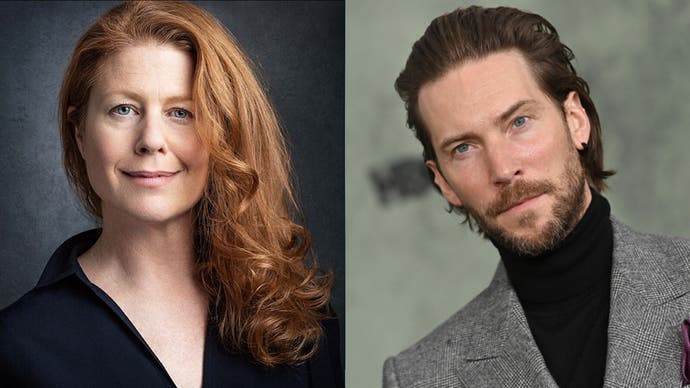Voice actors remain sceptical about the use of AI in gaming
"It feels a little bit Little Mermaid."
The use of AI is becoming more prevalent in the games industry, with the likes of Ubisoft creating an AI tool for script writing and its use more widely for both art and voice acting.
High on Life, for instance, used AI for both art and voice acting, while AI voice cloning is being used by modders to replicate the work of actors.
At last night's BAFTA Game Awards, a number of actors spoke to Eurogamer about their scepticism of whether AI can truly replicate human performances and what its impact could be on the voice acting industry.
"It sends a little chill down my spine and I think that we have to really understand what AI is and get out in front of it, because - we see this from time to time - the technology is moving faster than the legislation around it," said Jane Perry, last year's Performer in a Leading Role winner for playing Selene in Returnal.
"And the excitement of what AI can do is perhaps not allowing us to see the pitfalls and appreciate the pitfalls. For voice actors and for others in games who are making the creative content, the opportunity for our creative endeavours and work to be taken is quite high. So I think we just need to start having proper conversations about it. AI is here to stay and it has great use in the games industry and other industries as well of course, but it's about proceeding with caution and care."
She then joked: "I could summarise all that by saying it scares the shit out of me."
Charlotte McBurney, nominated for her role in A Plague Tale: Requiem, felt similarly.
"To be honest I think a lot of my voice acting colleagues are quite freaked out by the possibility of people being able to replicate their voices," she told Eurogamer. "It feels a little bit Little Mermaid, having your voice taken out and reappropriated and put somewhere else."
McBurney admitted that it's going to exist in some way, but she's concerned for its potential impact.
"It's going to exist, it just is, but there are ways of using it to our advantage. It would be fabulous if we can take it back a little bit. I think you can still appreciate people's real voices and the real performances. I'm really hoping it's not going to start to take away from a really beautiful, blossoming industry because I feel like we're only just starting to fully embrace and celebrate voice acting talent."
Both Manon Gage (nominated for Immortality) and Melissanthi Mahut (Kassandra in Assassin's Creed Odyssey, who presented an award) noted that AI is unable to replicate the humanity of a real performance.
"What I'm slightly apprehensive about is I don't think it's ever going to reach the point where it sounds organic and natural enough and directable enough, or give that element of surprise or a surprise performance that you're going to get from a human being," said Mahut. "Yes you can tweak it and you can perfect it and you can make it sound like someone's voice exactly but I'm hoping that you're never going to be able to get an original reaction or original performance of something."
Said Gage: "I think right now it's sad that what seems to be happening is AI is taking jobs away from artists across the board. Actors I think are next. In the age of late-stage capitalism, it makes sense that this is where we're at. But there's a humanity to making art, whether it's a video game, a television show or a painting that I just don't know a machine can achieve. Being in the games world is an interesting place to be with that because it is half the machine, but it's half the human side too."
Call of Duty: Modern Warfare 2 actor Alain Mesa was scepitcal but thought AI could be cool, unless it affects him financially.
"I can tell you I'm not sure if AI can create the type of emotions or the type of history that actors have - they just can't," he said. "They can try and replicate those emotions but life is ever changing, the actor I was ten years ago is not the one that I am today or the one that I'll be in ten years. And I don't think you'll be able to just programme a computer. I think it's cool, I know a lot of actors are really against it but I just don't think it'll work really. But if somebody is making money off of Alejandro's voice without Alejandro then wait a minute!"
Troy Baker, meanwhile, is willing to embrace AI, noting how it's already used in gaming and he's willing to work alongside it.
"There's already AI happening," he said. "There's AI that's how NPCs work, AI recognises input from players responding to programming. So as long as we understand it, as long as we are using it in a way that is benefitting and moving the medium forward, I'm for it. If my job can be replaced by an AI, it's going to be. So it's incumbent upon me to prepare for that. I don't want to fight stuff that's going to be inevitable. If there's an easier more efficient way to do it, then that's probably what's going to happen.
"I think that us as creatives, as artists, are always dodging information and technology in some way so it's incumbent upon us to educate ourselves, to have a dialogue with the people that are looking to use these kind of tools and find out how we can continue to be an asset rather than a replaceable liability."


